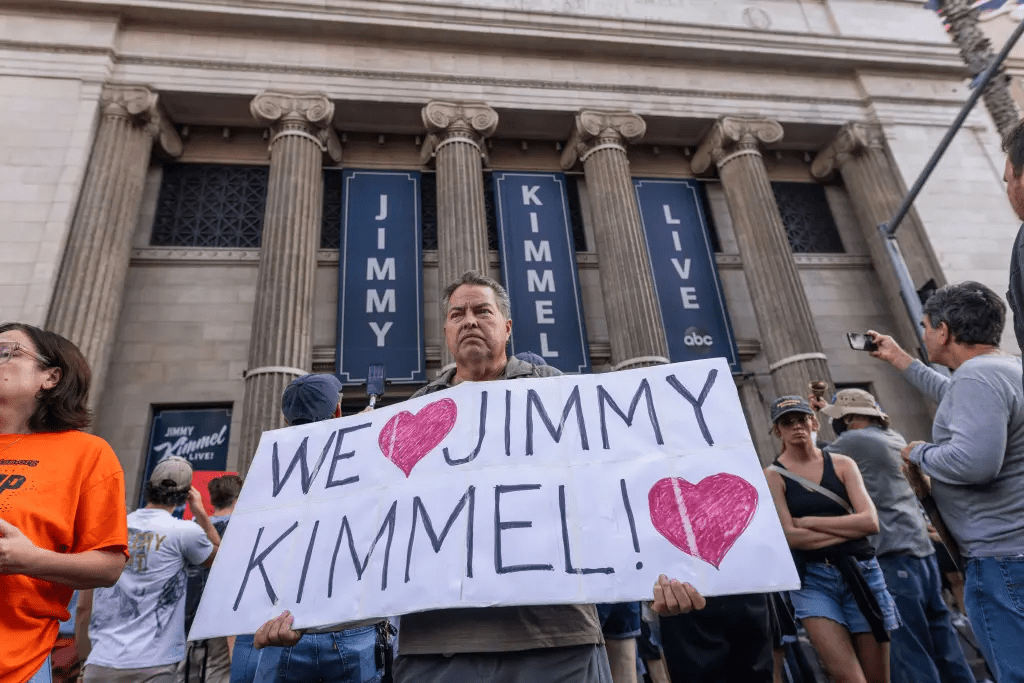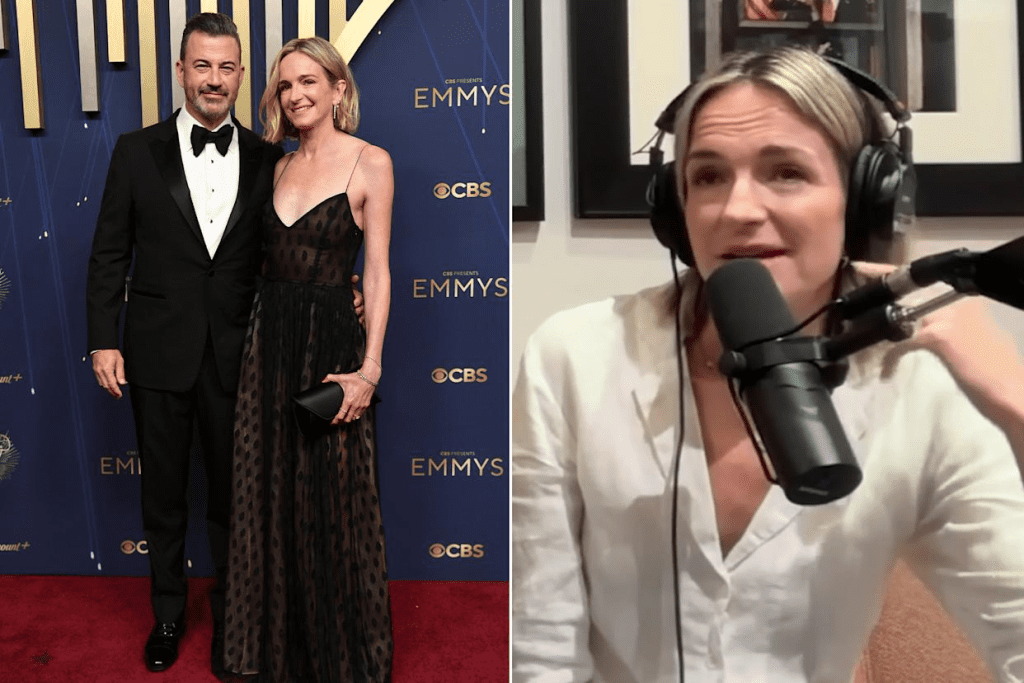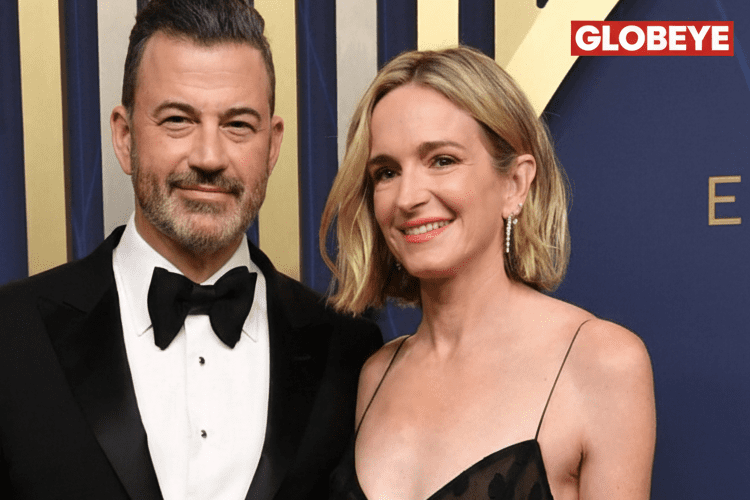Exclusive: Molly McNearney Reveals She Fired Off DOZENS of Emails Begging Her Family Not to Vote for Trump — Now She’s Cut Ties
Jimmy Kimmel’s wife, Molly McNearney, has opened up about a deeply personal cost of political division — and the story she shared on the podcast We Can Do Hard Things is as raw as it is telling. She revealed that in the run-up to the 2024 election, she sent “many emails” to conservative members of her own family, pleading with them not to vote for Donald Trump — and that as of now, several of those relationships are effectively broken.
“It hurts me so much because of the personal relationships I now have, where my husband is out there fighting this man, and to me, them voting for Trump is them not voting for my husband and me and our family,” McNearney said, describing frustration mixed with heartbreak. She called her relatives “deliberately mis-informed” and confessed that she’s “angry all the time” over the situation.

McNearney, who serves as head writer and executive producer of Jimmy Kimmel Live!, explained that the decision to speak revealed a boundary she could no longer ignore. She referenced a specific email she sent: “I’m begging you. Here’s the 10 reasons not to vote for this guy. Please don’t.” She said the response was mostly silence — or “truly insane” reactions from a few of the recipients.
For years, Kimmel has taken aim at Trump on his late-night program, often blending comedy with commentary. In September 2025, the show was briefly suspended by ABC and Disney affiliates after comments about the shooting of conservative activist Charlie Kirk. The same month’s disclosure from McNearney adds another layer: this isn’t just show-business schtick, it’s deeply personal. She framed the divide between her and her relatives not as mere politics, but as a breach of shared values and identity.
“What I unfortunately have kind of lost is relationships with people in my family because of it,” she said, noting she now feels closer to relatives who share what she deems “the right alignment.” “And I hate that this has happened.”

For McNearney, the political allegiance of her own kin felt like a rejection of not only her but the life she shares with her husband. She described the tension as not simply Republican vs Democrat, but about “family values” — implying that the vote wasn’t just a ballot but a symbolic blow. In her words, “To me, them voting for Trump is them not voting for my husband and me and our family.”
The story exposes a broader truth about 2020s America: the political fault lines are carving into the living rooms and dinner tables of everyday families. McNearney’s case isn’t unique — but it stands out because she is public, she is in the entertainment limelight, and she has given voice to a type of pain that many are only silently enduring.
In the podcast episode, she candidly admitted that she wishes she could “deprogram” herself — a startling phrase in itself. She said she’s angry “all the time,” not because of hate but because of the sense of betrayal and helplessness. The comparable measure? She feels that members of her family were locked into a worldview she cannot share, and the result has been emotional distance and loss.

Yet in the midst of heartbreak, there is nuance. McNearney said she still holds sympathy for some family members. She described them as “deliberately mis-informed but not unkind” — a subtle distinction that reveals the emotional complexity. Her choice to disclose publicly suggests she’s beyond private pleading. She’s addressing a question: what happens when a loved one’s vote echoes so loudly it fractures bonds?
Media observers took note of how this moment taps into the intersection of celebrity culture and politics. McNearney’s transparency may not resolve the wider political storm, but it humanises the cost. When the host of a late-night show mocks politics, it may seem lighthearted. But when the producer writing the jokes is silently grieving over family rifts, the stakes feel different.
For Kimmel, the moment may reshape more than the show’s monologues. He is no stranger to controversy, and the recent suspension highlighted that late-night comedy in 2025 does not exist in a vacuum. McNearney’s revelation gives the backdrop a new dimension: the satire, the mockery, the network headlines — but also the personal cost within his own circle.
What remains to be seen is how this will echo beyond the Kimmel household. Will it spark reflection among other families divided by politics? Will it shift discourse away from online battlegrounds to dinner-table repairs? McNearney’s comments hint at a desire for reconciliation — but the path to that repair may not lie in public podcasts or late-night monologues. It may lie in vulnerability.

In her own voice, McNearney admitted regret. “It feels silly,” she said, referring to how politics overwhelmed her family dynamics. She enforced boundaries, yes, but also acknowledged pain. The loss of family ties over a vote is not something easily measured or healed. The woman who crafts jokes and sketches now recounts grief. She stands at the intersection of influence and intimacy, public and private.
The story is a reminder that for many Americans — celebrity or not — political allegiance is more than ideology. It is identity, loyalty, sometimes kinship. When a member of the family votes in a way you believe dismisses or devalues you, even if unintentionally, the emotional fallout can be enduring. McNearney’s decision to speak is courageous, but also vulnerable. She invited the public to witness what many feel behind closed doors.

In the end, the revelation is not just about one late-night TV producer and the host she supports. It’s about what happens when political theatre spills into real lives. When jokes no longer suffice. When elections don’t just determine policy but disturb households. As McNearney said, it wasn’t about the election — it was about who she felt supported her husband, their family, their values. And when that felt compromised, the consequence was loss.
Her final choice was clear: she will protect her well-being and her alliances. She will keep the family members she feels aligned with close, and step back from those she cannot reach. It is a decision shaped by heartache, yes, but also by self-respect. In 2025, when politics divides not just nations but surnames, the cost of a vote can be more than a number — it can be a relationship.


